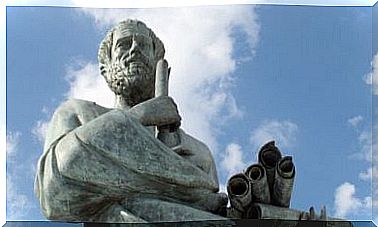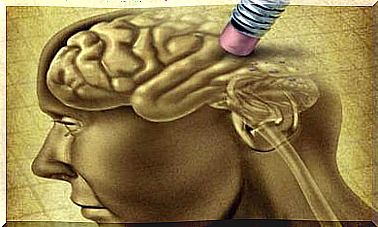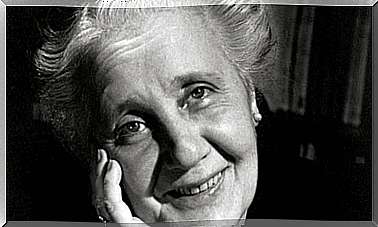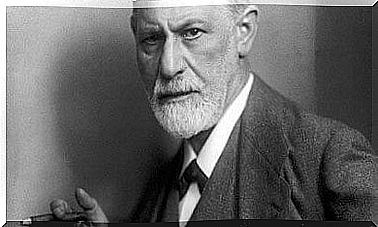35 Sentences By Gandhi To Understand His Philosophy
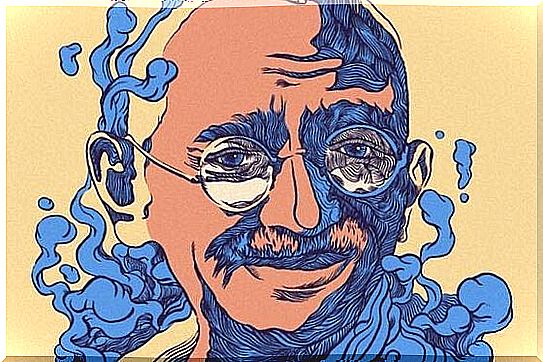
Mahatma Gandhi has inspired countless generations, making a significant impact on people’s lives to this day. Gandhi’s phrases touch the hearts of thousands of people. His spirituality, simplicity of heart and philosophy of non-violence are a unique legacy. Few figures in our history have encouraged us to live in peace and in accordance with the truth like Gandhi.
Scholars of Mahatma Gandhi’s work say that his thinking was tremendously multifaceted and that his philosophy can seem quite complex that it would take several volumes to try to describe it. However, to ease the way for all those who wish to delve deeper into his work, some scholars have divided Gandhi’s philosophy into four pillars: non-violence, Sarvodaya (socially committed Buddhism), Satyagraha (soul strength) and the search for the truth.
There are four well-defined but linked areas: religious ideas are in harmony with their social ideals. In his philosophy there is a clear purpose, a contained hope: to encourage humanity to trust itself, to convince us that we are capable of creating positive change in our society, also achieving higher moral development.
Gandhi’s phrases about non-violence
When we read Gandhi’s phrases, we sense almost immediately that we are not facing the work of someone who wanted to convey to the world a rigid, inflexible, or remarkably rigorous doctrine. Rather, they are a set of principles that invite us to reflect and can be applied to any area of our lives. We can understand, for example, that there is nothing so fundamental to break the cycle of violence as love, dialogue or respect for others.
Therefore, we propose you to read them and analyze them calmly, without prejudice, without worries and willing to receive small lessons that are still very current.
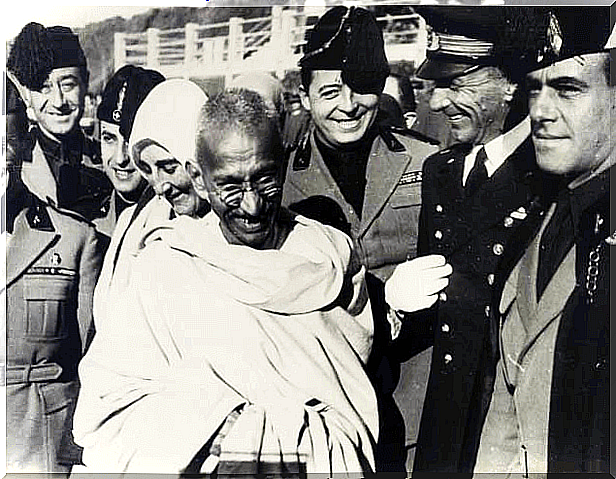
1. We must not lose faith in humanity. Humanity is an ocean; if a few drops are dirty, the ocean doesn’t become dirty
Ahimsa is a concept that comes from Sanskrit and that gave rise to this philosophy so characteristic of Gandhi, where he defends non-violence and respect for life.
In the same way, we can say that what defined Gandhi was his unshakable hope in humanity, that is why he encouraged the population to have a positive attitude of tolerance, patience, charity and never lose faith in human beings.
2. Violence is the fear of the other’s ideals
This is one of Gandhi’s most famous phrases and defines the essence of his philosophy: don’t be afraid of the different, don’t be afraid of those who think differently, those who have an opinion contrary to yours. This anxiety in relation to the “other” is a symptom of weakness.
3. An eye for an eye and the world will be blind
Violence breeds more violence. Humanity must stop using aggression, revenge and hate as a form of language. The only thing we’ll get out of this is to perpetuate evil.
4. Hatred and intolerance are the enemies of perfect understanding
Gandhi used to defend the importance of dialogue as a way to weaken differences and intolerance. Only those who are able to sit face to face to converse with humility can reach perfect understanding.
5. Poverty is the worst form of violence
This is one of Gandhi’s phrases that remain valid today. Poverty remains a structural violence that, far from weakening, continues to silently advance in our society.
6. There was a time when leadership meant physical strength, but nowadays it means knowing how to deal with people
A good leader is not imposed by power or violence, but with respect, with the sensitivity of the heart.
8. There are two types of powers: one is gained through fear of punishment, and the other through love. Power based on love is more effective and permanent than fear of punishment
For Gandhi, love is the way to reach the truth. Once we find our ideal, we will be able to fight violence to make respect, coexistence and charity the most solid pillars of our societies.
9. Non-violence requires a double faith: faith in God and faith in man
Nonviolence for Gandhi was a “great power” that must be accepted as a law of life. It must permeate our entire being, our thoughts and be reflected in our actions.

Gandhi’s best phrases about Satyagraha (the strength of the soul)
11. The purpose of life is to live right, think right, and act right
The Satyagraha principle is essential to understanding Gandhi’s philosophy. This concept indicates that a person should live in harmony with himself, free from fears, prejudices and always based on the ideal of truth as a life purpose.
12. Happiness is when what you think, what you say and what you do are in harmony
This is one of Gandhi’s phrases where this principle of harmony between acts and thoughts is again emphasized.
13. Be the change you would like to see in the world
A Satyagrahi, that is, a person who is courageous and whose principle is respect, love and truth in his heart, feels capable of making this world much better.
15. The justice that love brings is redemption, the justice that the law brings is punishment
Gandhi’s principles always have a moral connotation. Among them, the clear resistance to injustice, the development of a spirit to serve others, of selflessness and sacrifice, always stands out. He also always emphasized the importance of making love and simplicity the best weapons for action.
Gandhi’s Sentences on Sarvodaya: A Committed Society
Gandhi dreamed of an ideal society, free from all forms of exploitation, social differences, violence and injustice. These are some phrases that represent this lofty purpose, a commitment for which we are all responsible.
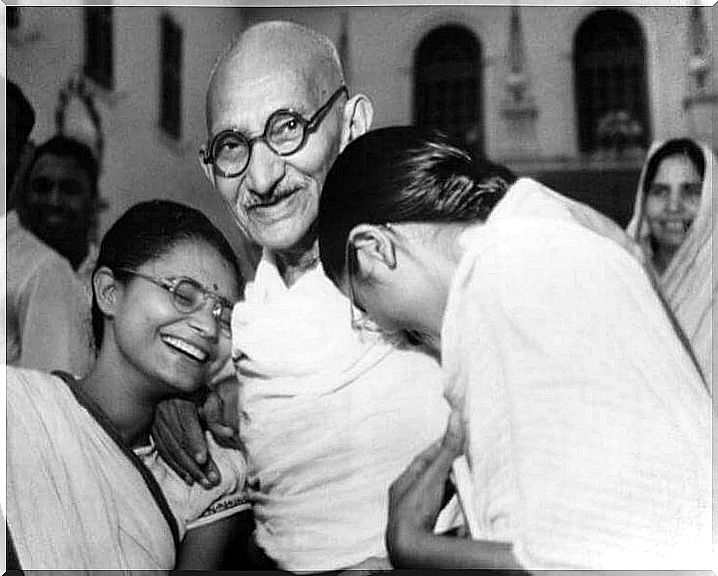
16. The future depends on what you do today
The future of our society depends on the small changes we can make in the here and now, committing ourselves to the principles of love and justice.
17. The joy is in the struggle, in the attempt, in the suffering involved, not just in the victory
One of Gandhi’s most valuable lessons: success is not just about achievement, it’s all the way through.
18. There is plenty in the world for man’s needs, but not for his greed
This social objective described by Gandhi as Sarvodaya refers to a term that he invented himself and that can be translated as the need to seek the well-being of everyone, without exception. Thus, it is very clear that greed, in a world where there are already many resources and enough opportunities for everyone, does not make sense.
19. A sincere disagreement is often a sign of progress
The importance of dialogue to smooth out roughness and differences is a basic pillar of Gandhi’s philosophy. A respectful disagreement between two people is a way to move forward in any area of life.
20. It is not enough for our ears to be satisfied, for our eyes to be satisfied, it is necessary for our hearts to be touched and for our hands and feet to move
A society that wants change must be a society capable of acting, of moving, of generating a movement that starts first within each one, from one’s own heart and then reflects on their actions. A good leader must, in turn, be able to inspire real hope that can bring about change in his people.
21. No culture can survive if it wants to be exclusive
The concept of Satyagraha can and should be practiced in all cultural settings, otherwise we will be lost. This is one of Gandhi’s phrases that best exemplifies him. Thanks to this, people will understand that exclusivity, distrust, the differences between my religion and yours, the fierce antagonisms between my ideas and yours, build walls and sow violence.

23. It is difficult, but not impossible, to manage a business honestly
Moral strength is the engine that must move all of society, starting with our own homes and small businesses. Thus, according to Gandhi, each individual must be trained in honesty, humility and justice to be a useful citizen, assuming their responsibility and fulfilling their duties to create a much better world.
24. A leader is useless when he acts against the impulses of his own conscience
This is one of Gandhi’s most representative phrases. He always advocated political decentralization, to avoid leaving power in the hands of a few people or just one.
Little by little, an all-powerful leader seeks only his own benefit, which is why he has always advocated a direct and participatory democracy.
25. Peace between countries must be based on love between individuals
Only through love can we reach truth and peace in all societies. Furthermore, a constant idea in Gandhi’s philosophy is to show us that our concept of God is the reflection of love and the only way to weaken our enemies and the forces of evil.
To achieve that ideal society that Gandhi dreamed of, it is necessary that we start with ourselves and those around us. If we respect and love our family, our neighbors and our culture, we will be able to do the same with the countries around us.
26. If we want true peace in the world, we need to start with children
To create a better society and a happier future governed by love and harmony, we need to care for and educate young people in the principles of peace and non-violence.
Gandhi’s Phrases about Truth
These key concepts that make up Gandhi’s philosophy find their true meaning in their etymological roots. The word “truth” has its origin in Sanskrit, “Satya”, where “sat” means “what exists, what is real”. Therefore, for Gandhi, the idea of truth is applied when thinking is in tune with the actions themselves and when a society defends a moral code that encourages this purpose in its citizens.
These would be some of the messages that best represent this idea, this goal:
27. The truth remains even if it has no public support
This is one of Gandhi’s best-known phrases. Each can maintain, safeguard and defend their own truth, although most tell us otherwise.
28. Truth is, by its very nature, self-evident. Once you eliminate the cobwebs of ignorance that surround it, it manages to shine.
The truth is always there, before us. However, many times we let ourselves be manipulated, we let ourselves be carried away by negligence, submission or even ignorance. Few acts require as much courage as knowing the truth and acting on its principles.
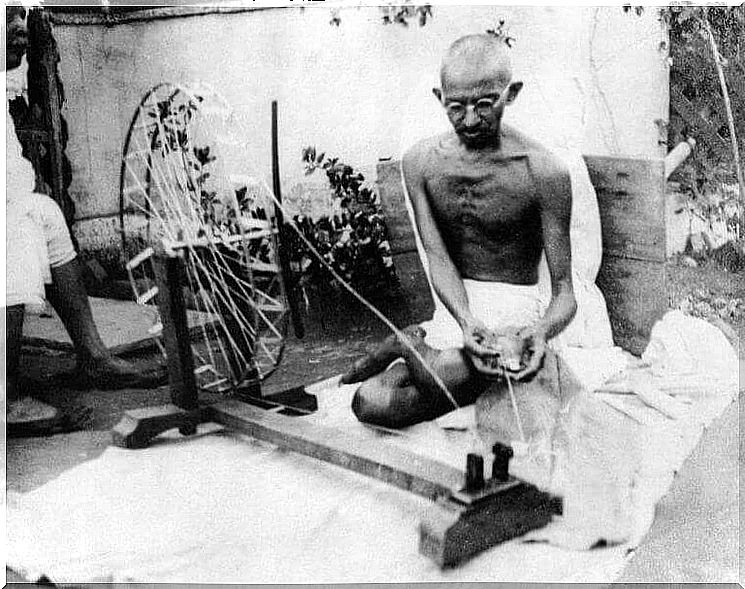
9. My life is my message
We have already said that “Satya”, the truth in Sanskrit, means what is real, what exists. In turn, Gandhi defended the idea that the truth does not make sense if someone thinks one thing and does the opposite. Therefore, India’s pacifist leader always lived in harmony with everything he preached, leading a humble life dedicated to others.
30. Believing in something and not living it is dishonest
Here the same principle is reinforced once more: the need to live in harmony with our own truth, with our own beliefs.
31. The truth prevails, even if there is no public support. it supports itself
Some say that this pacifist leader was an idealist. We can even agree with this, however, in many of Gandhi’s texts and phrases we deduce that it is a very practical idealism, very useful and that it can be applied in many of our contexts.
All of us, at some point in our lives, whether in the family or in the workplace, have already defended our truth, despite our lack of support. Sooner or later, falsehood or injustice is discovered…
32. The truth never hurts a cause that is just
As much as we are afraid to tell the truth in a certain environment, if this place, if this context is fair, the truth will always be respected and valued.
34. Everyone can hear your inner voice. she is inside us
To get in touch with our truth and act on it, we need to listen to our inner voice. This dialogue with oneself must be constant and permanent. In this way, we will find the strength to act in the face of what we consider unfair and that offends our truth.
35. Truth is the end and love is your way
The opposite of violence is love. This is the only way to build a society capable of defending the truth, capable of thinking and acting in accordance with this principle, moving daily along the path of charity, dialogue, equality, fraternity and justice.
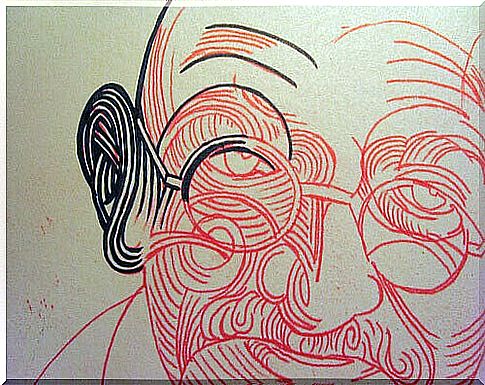
As we have seen, Gandhi’s philosophy and phrases do not just have moral, political and religious connotations. Above all, it is a compendium of knowledge that, despite being rooted in Indian culture, remains very current and very useful.

